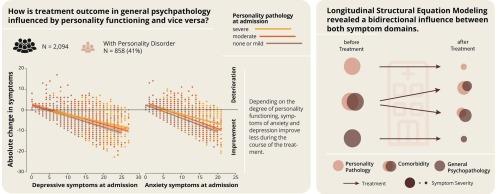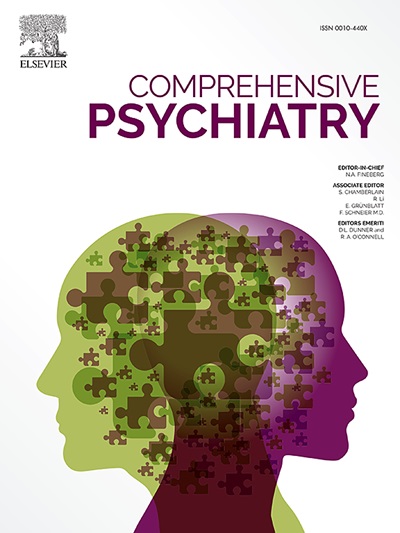The interplay of personality pathology and treatment outcome in psychosomatic psychotherapy: A longitudinal analysis using latent change score modelling
IF 4.2
2区 医学
Q1 PSYCHIATRY
引用次数: 0
Abstract
Introduction
While ample data demonstrate the effectiveness of inpatient psychosomatic treatment, clinical observation and empirical evidence demonstrate that not all patients benefit equally from established therapeutic methods. Especially patients with a comorbid personality disorder often show reduced therapeutic success compared to other patient groups. Due to the heterogeneous and categorical personality assessment, previous studies indicated no uniform direction of this influence. This complicates the derivation of therapeutic recommendations for mental disorders with comorbid personality pathology.
Methods
Analyzing n = 2094 patients from German university hospitals enrolled in the prospective “MEPP” study, we tested the dynamic interaction between dimensionally assessed personality functioning and psychopathology of anxiety and depression.
Results
Longitudinal structural equation modelling replicated the finding that the severity of symptoms at admission predicts symptom improvement within the same symptom domain. In addition, we here report a significant coupling parameter between the baseline level of personality function and the change in general psychopathology - and vice versa.
Discussion and conclusion
These results imply that personality pathology at admission hinders the therapeutic improvement in anxiety and depression, and that improvement of personality pathology is hindered by general psychopathology. Furthermore, the covariance between both domains supports the assumption that personality functioning and general psychopathology cannot be clearly distinguished and adversely influence each other. A dimensional assessment of the personality pathology is therefore recommendable for psychotherapy research and targeted therapeutic treatment.

心身心理治疗中人格病理学与治疗结果的相互作用:使用潜在变化评分模型进行纵向分析
导言虽然有大量数据证明了住院心身治疗的有效性,但临床观察和经验证据表明,并非所有患者都能从既定的治疗方法中同样受益。尤其是合并有人格障碍的患者,其治疗成功率往往低于其他患者群体。由于人格评估的异质性和分类性,以往的研究表明这种影响没有统一的方向。结果纵向结构方程模型重复了入院时症状的严重程度可预测同一症状领域内症状改善情况的结论。讨论与结论这些结果表明,入院时的人格病理学阻碍了焦虑症和抑郁症的治疗改善,而人格病理学的改善又受到了一般精神病理学的阻碍。此外,这两个领域之间的协方差支持了这样一种假设,即人格功能和一般精神病理学无法明确区分,并且会相互产生不利影响。因此,人格病理学的维度评估对于心理治疗研究和有针对性的治疗是值得推荐的。
本文章由计算机程序翻译,如有差异,请以英文原文为准。
求助全文
约1分钟内获得全文
求助全文
来源期刊

Comprehensive psychiatry
医学-精神病学
CiteScore
12.50
自引率
1.40%
发文量
64
审稿时长
29 days
期刊介绍:
"Comprehensive Psychiatry" is an open access, peer-reviewed journal dedicated to the field of psychiatry and mental health. Its primary mission is to share the latest advancements in knowledge to enhance patient care and deepen the understanding of mental illnesses. The journal is supported by a diverse team of international editors and peer reviewers, ensuring the publication of high-quality research with a strong focus on clinical relevance and the implications for psychopathology.
"Comprehensive Psychiatry" encourages authors to present their research in an accessible manner, facilitating engagement with clinicians, policymakers, and the broader public. By embracing an open access policy, the journal aims to maximize the global impact of its content, making it readily available to a wide audience and fostering scientific collaboration and public awareness beyond the traditional academic community. This approach is designed to promote a more inclusive and informed dialogue on mental health, contributing to the overall progress in the field.
 求助内容:
求助内容: 应助结果提醒方式:
应助结果提醒方式:


